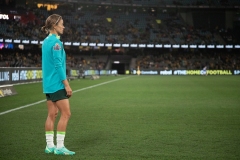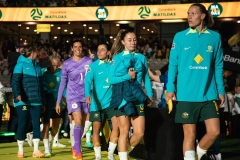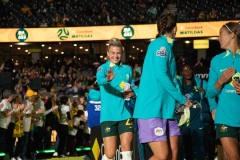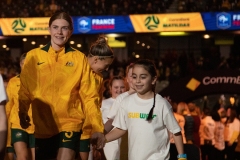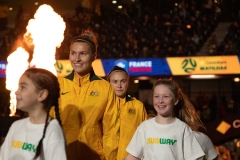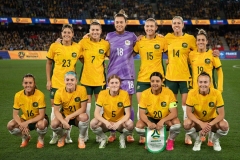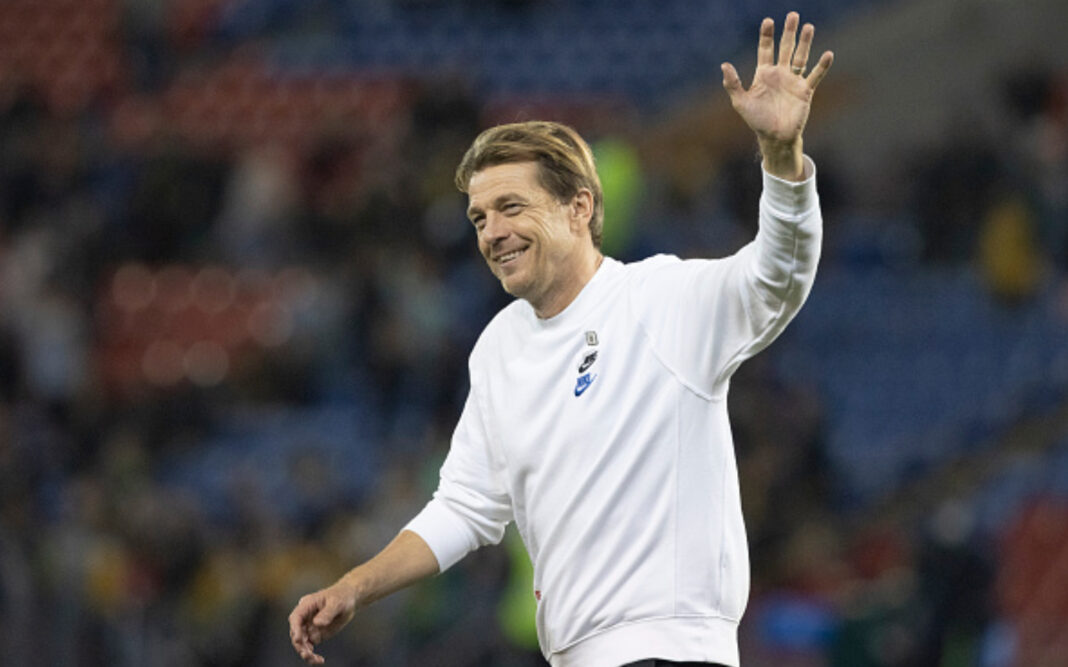

In the lead up to the 2022 AFC Asian Cup, we were fortunate to get some one on one time to chat with Matildas Head Coach, Tony Gustavsson. If you haven’t listened to the podcast yet, here’s a transcript.
Can you discuss the concept of accountability, from you having a plan, coaching to the plan, adapting the plan based on the results and the outcomes? And then at what point it becomes the accountability for the players to take over when they’re on the field and making sure they’re accountable throughout the game.
Wow. How many minutes or hours do I have? This is a big and interesting question.
First of all, I think it’s important to bring it back to where it all starts because I build everything we do on the field, before I hold anyone accountable, I build everything we do on the field, on the qualities of the players. So it’s not Tony’s game plan and all of a sudden try to fit players into that. It’s about looking at what are the core qualities of the players, especially the best players and how do you bring the most out of them.
Together with a team, get them included and have their input in setting a goal. This is what we want to achieve, but also answering the how. How are we going to achieve it? But maybe the most important question is the why. Why do I want to do this? You know, why do we want to play this way?
Or why should player X provide the width on this part of the field or why should we press a certain way? And if everyone had the buy-in to the why, I also think it’s much easier to then look at accountability because then all of a sudden. I can hold someone accountable, but more so they can hold themselves accountable and they can hold a team accountable because we agreed on why they’re doing it.
And then we can hold ourselves accountable on the how, like this is what you were supposed to do, or this is what I’m supposed to do. And that inner voice also from a player perspective on the field, like this is what I’m supposed to do. And also the wanting and the drive and the inner motivation to actually do it because its part of a bigger picture.
I think that’s the approach I tried to have from a leadership perspective.
Is that accountability within their skillset or their knowledge and, or is it a stretch target?
I think it depends on which individuals we’re talking about here because every individual is different, like in every workplace. Some players might be too critical on themselves and hold themselves accountable in a way that they shouldn’t. They should relieve that handbrake a little bit. Some players are too loose. Some players are really good communicators and communicate to others and hold others accountable.
But then it’s that classic one, like you know, it’s that core of clean your own carpet first before you demand anyone else to do it, you know, do your business first before you try to hold others accountable is also important. So I do think it’s, it’s different for each individual, but I do know though it’s very important for any successful team that you have formal and informal leaders that can drive that performance.
That’s a great segue into the next question as well. In Australia, Rick Charlesworth was the coach of the Hockeyroos during a really successful period. One of the approaches he had was effectively a rotating captain, because what he wanted to see was accountability, responsibility, and leadership through all the players, not to have it as one person who had to do that all the time.
I wonder about your thoughts on leaders versus captains?
This is also a very interesting question because I do think leadership is not just one captain to lead a team and everyone else follows.
I think you can be leaders in so many different ways. Sam Kerr, for example, as a captain, she’s a completely different captain for example, than when I worked with Caroline Seger in Tyresö, who’s also the captain for the Swedish national team.
But every captain needs to be having the license to be themselves and be true to who they are. Sam Kerr needs to be captain as Sam Kerr is captain. Then you have a different leader, like Clare Polkinghorne, for example, who leads by example, the way she’s a professional every single day and the way she commits on the field to always give it a hundred, even if she doesn’t do it verbally all the time, she’d do it physically and with her presence as a person.
So there’s so many different ways of leading, but what we’ve talked about also is it could be different people leading in different situations. Everything from, who is the voice in the locker room or who is the voice in the huddle or who is leading when we press high or who is leading when we defend our goal zone, or who is leading when we have an attacking corner or who is leading when we have a team-building activity, or I can mention so many different examples.
I think it’s important to create room in an environment like this. It’s not just one person that leads all the time. We can take turns, but also the same thing with staff. It’s not always the head coach leading. It can be different voices that lead in different areas, also in a national team environment.
An analogy I have used when looking at teams is – do you have the whole orchestra that you need? Do you have a violinist? Do you have a piano player or do you play around them somehow? You can still make beautiful music or you can still have a beautiful game of football, even if you don’t have all of those elements.
Fantastic. Good analogy and metaphor. Actually, that reminds me about the discussion we’ve had the last two weeks here, very intense discussion with the coaching staff in terms of roster selection, because when you discuss it, you know what roster you should bring to the tournament, you actually talk about those things. What are the different instruments that we need or different skillsets that we need?
Some of the players that are picked to the roster might not be the best player, but the best instrument for that orchestra in that tournament, if that makes sense. And I’ve spoken a lot about game-changers. It’s not just about a starting 11, it’s also about the finishing 11. If you look statistically in tournaments, most of the games, especially in playoffs, are won in the last 30 minutes or even in extra time and PKs.
And those game-changers are crucial. So you look at bringing different instruments into that orchestra when you build that roster. Whether that’s aerial presence, or pace, or one v one skillset, or defending skill set or that unique, sharp tool that you need that maybe that the roster hasn’t had before.
We tried to balance that, but at the same time, you want to have enough options to be true to how you play, even if player X, Y, and Z is playing, you want to make sure that you have those core values and core qualities in the team as well.
For example, we run a lot, you know, this team runs a lot. It’s a, it’s a high octane running game. We press and we attack and it’s back and forth from 18 to 18. And so there are some core values that need to be in there, but then you want to have those different tools or different instruments like you talk about.
📋 #WAC2022 SQUADS – 🇦🇺 Australia
The Matildas name their squad ahead of #WAC2022 in a list that includes stars Sam Kerr & Kyah Simon! pic.twitter.com/p1Axao7tC0
— #AsianCup2023 (@afcasiancup) January 12, 2022
Were there a couple of players who were close to making the squad that you could comment on?
Out of respect to those players and to those clubs, I might not want to go into names, but what I can say [is] that there’s plenty of players left outside of this roster that have quality that deserve to be picked.
That’s the toughest process, to be honest. A coach that says, or at least if I would say, “Hey, picking a team, it’s an no brainer, it’s just part of the job picking a starting 11 is easy”. No, I don’t think it’s easy.
I don’t like it to be honest because you need to tell people that you’re not included. And I don’t like that to be honest, but it’s a part of the head coach job and it needs to be done, but it’s not fun to leave players out, especially when you know that they have quality and, or deserve to actually be brought into the roster.
Speaking of the head coach role, how are you tackling your own growth in that role? Are you still learning? Because a coach can go from team to team and it might be different pieces of equipment that you work with, being the players, but how do you learn and how do you grow and where do you get your inspiration?
As you heard me say so many times, I always talk about one day better and it comes from actually my own passion from [when I was] young. I always wanted to learn. Curiosity is important to me. There’s no coincidence that I have six and a half years of university study, and a lot of government loans to do those studies because I want to learn.
I’ve done a lot of visits to clubs, different countries, read a lot of leadership books, listened to Ted talks and listened to podcasts, having walks and talks with a lot of people to discuss everything from, “What is success? What does that stand for? And what, where does it come from? And where’s the why in leaderships and people drive and motivate.”
I can go around and around about this because it’s my true passion.
How do I get better? Even like this talk, I’m probably going to reflect on this one because you’ve asked a lot of interesting questions that make me think about things and probably, this talk itself is going to make me one day better.
Every meeting with people I’m going to take something new away. And yes, this last couple of weeks, I’ve learned a lot because we have a lot of new staff members coming into this tournament and being in a dialogue and conversation with those staff members has also taught me a lot. Everything from sports science to tactical analysis of an opponent. I learn every day and the day I said I’m fully learned, I’m probably done. I’m done with this job. I’m not going to be successful anymore because I think we need to have that growth mindset and keep getting one day better.
A couple of questions about the tournament, one of them being activating Sam Kerr, which is something that you’ve mentioned, and then the other thing is for the opening game, who in particular from Indonesia could specifically trouble the Matildas or break down the game a little bit in the way that you might want to play it.
I struggled in the beginning to find the right solution to activate Sam Kerr early last year and I was open with that as well.
I had a lot of conversations with Sam. How can we bring the most out of you and get the players around you, width, depth, and all these kinds of things, and have people facilitate you so that you can do your best or be your best. I think in the Olympics, we found a good solution on it.
Scoring six goals in a tournament as a 9, it’s a good stat. I do think we find ways and I’ve seen progress. No matter if you play 3-4-3 or 4-3-3, we have a really good idea of what we need around Sam for Sam to be successful. She’s probably going to have two people playing very close to her defensively through the whole tournament in the Asian Cup here.
We need to find different ways to solve that. What can cause a problem? Who can cause this problem? I think in the group stage, we’re going to see a lot of tight low defending blocks. There’s going to be very limited space behind the backline, very limited space in the goal zone, in the box with a lot of numbers defending.
We know we’ve seen it in the men’s game and the women’s game and in the Champions League. We’ve seen it in big tournaments from national teams, how difficult it is to break that down. I think we need to be patient. Mentally patient, but also we need to be proactive and have ways to create space for our, our pacey players.
We’ve done a lot of analysis on why we haven’t succeeded in winning this tournament for over a decade.
Last time we won, it was 2010. And to be honest, the stats are not really good against Japan, which could be looked upon as a key opponent in a tournament like this, but we need to be humble and say, there’s other teams that can hurt us on the way. Looking at the ranking, maybe it should be a key game between the Matildas and Japan. And I think since 2010 in competition, we have only one win.
One win in over 11 years against Japan in competition mode is not good stats. And we asked the key question, why is that? And how are we going to change that?
And we spend a lot of time focusing on that, not to go into details to reveal too much, but we do have a plan, how we think we can go about it.
Don’t forget to tune in for our opening group stage game of the @afcasiancup!
🇦🇺 v 🇮🇩 – 21.1.22 – Mumbai Football Arena – 9:00pm AEDT @10footballau#WeAreMatildas #WAC2022 https://t.co/nnrl6uaAqe pic.twitter.com/FAhydojpde
— CommBank Matildas (@TheMatildas) January 13, 2022
Thank you so much. And with all the great support from everyone around I know it’s going to be an amazing tournament, like the Olympics as well. So we feel the support from everyone.
Don’t forget we’re live on Facebook on Monday evenings and you can subscribe to the Beyond 90 Podcast on iTunes, Spotify & Google Podcasts or anywhere you listen.
Catch up on Cluch Radio 7pm Tuesday’s or 7pm Wednesday’s on JOY 🌈 AEDT.


